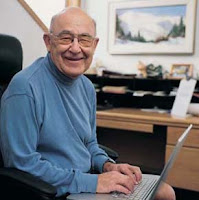I first met Professor Donald Graves on the 19th August 1980. He was plenary speaker at the 'Third International Conference on the Teaching of English' at Sydney University, Australia. I was a Curriculum Consultant at the time and was one of 500 people crammed in a room that knew little about this man before that day. I can still see this jovial softly spoken man in his checked jacket, quietly but dramatically telling us about his research with Susan Sowers and Lucy Calkins in a New Hampshire school. His address was mesmerising and his opening statement simple:
Children want to write. For years we have underestimated their urge to make marks on paper. We have underestimated that urge because of a lack of understanding of the writing process, and what children do in order to control it. Then we say, "They don't want to write. What is a good way to motivate them?"This talk was one of the major springboards for Don's work to become more widely known around the world. I was fortunate not only to be there that day but also to drive him to my hometown some two hours away and talk non-stop the whole way about children, writing and learning. In 1984 I was fortunate enough to spend time with Don in one of his schools in New Hampshire. What a great privilege it was to know this man and learn from him.
Don taught us many things and was arguably the Father of 'Process Writing'. He had spent time looking at what adult writers did, and was bold enough to apply the knowledge of process that he gleaned from such writers, to his work with and observations of children. His friend Donald Murray (a great writer and teacher of writing at the University of New Hampshire) was a key influence on him. But it was his close observation of children that brought forth some of his greatest insights:
- Like adult writers children must be given the chance to choose their own topics, to have an environment in which writing is encouraged and facilitated, to take greater control of their writing.
- They must have 'real' readers - people who read their writing to hear what they have to say, not just to correct their spelling and grammar.
- Children must be allowed to make mistakes, to use approximations in draft writing and to become risk-takers in writing.
- As teachers we need to shift our attention from simply product and the surface features, to an equal concern with process and meaning.
- To teach young writers is to teach them the craft of writing.
- Spelling and grammar are best taught in the context of meaningful writing not simply as decontextualised activities.
- Teachers (and parents) must become observers of young writers, asking them questions that teach and that focus their attention on meaning not just the surface features of writing and neatness.
- Writing is about revision and re-writing and that like adult writers, children often need to 'make it messy to make it clear'.
- He also shared his practical tools for encouraging writers - folders for first drafts, dates to track development, writing conferences, celebration of authors, 'publishing' children's work, blank books in the hands of preschool children with the instruction, 'Why don't you write' and so on.
We will miss this great man who taught many of us many things.
Other reading
Don wrote many things but a couple that many of us know were:
Donald H. Graves 'Writing: Teachers & Children at Work', Exeter (NH): Heinemann, 1983
Donald H. Graves 'A Fresh Look at Writing', Exeter (NH): Heinemann, 1994.
That first famous talk in Australia can be found in:
R.D. Walshe (Ed), 'Donald Graves in Australia', Sydney: Primary English Teaching Association, 1981









0 comments:
Post a Comment